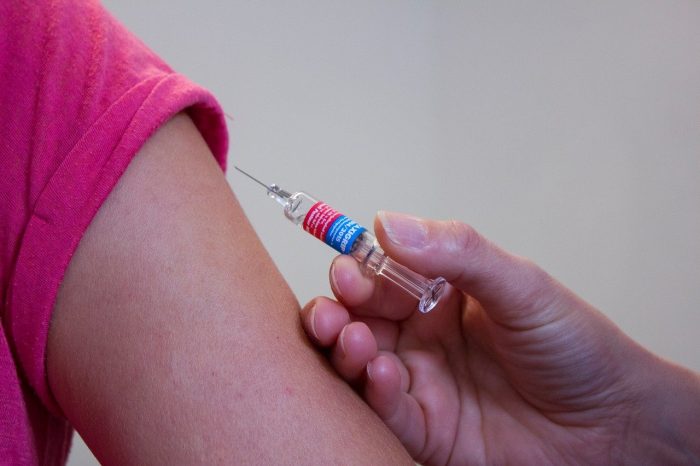Management of Pain for People with Intellectual Disabilities and Other Developmental Disabilities

According to the International Association for the Study of Pain (IASP), the definition of pain is “an unpleasant sensory and emotional experience associated with, or resembling that associated with, actual or potential tissue damage”1. As a staff member or a caregiver, it is important to remember that pain is a personal experience. Pain is meant to be a signal of danger to the body, and it can be related to different physical or psychiatric conditions. Untreated pain could lead to a variety of challenging behaviors. If someone is reporting pain, it should be respected and addressed.
However, some people may have difficulty verbalizing if they feel pain or discomfort. Pain can also be communicated behaviorally, through facial grimacing, crying, screaming, aggression, guarding or holding certain body parts, etc. It is the staff or caregiver’s responsibility to learn how to recognize symptoms of pain. PCHC has developed the Management of Pain for People with Intellectual Disabilities and Other Developmental Disabilities booklet. This resource focuses on methods to identify, assess, and manage pain in individuals who depend on others to interpret their unique communications. This important resource can be found on our website or via this link: PCHC’s Management of Pain for People with Intellectual Disabilities and Other Developmental Disabilities.
PCHC has a health promotion activity plan (HPAP) on chronic pain.
Visit here for our other physical health publications.
Free Virtual Course — Leadership: Creating Your Culture and Negotiating Across Diversity
Join Penn State on Thursday, July 8, 2021 for Leadership: Creating Your Culture and Negotiating Across Diversity, which will examine ways to establish your workplace culture and how to negotiate across a diverse group of people.
Register here for free today.
The Importance Of Updating Compliance Programs For Skilled Nursing, Assisted Living And Other Residential Care Facilities
Capitolwire: Gov. Wolf’s COVID-19 Disaster Emergency Declaration Will Come to an End
Capitolwire: Gov. Wolf’s COVID-19 Disaster Emergency Declaration Will Come to an End Once PA Certifies the May 18 Primary Election Results
By Chris Comisac, Bureau Chief, Capitolwire
HARRISBURG (June 10) — Led mostly by the bodies’ Republican majorities, the state House of Representatives and Senate on Thursday approved a concurrent resolution to terminate Gov. Tom Wolf’s COVID-19 disaster emergency declaration.
Additionally, the General Assembly sent to the governor legislation that would to give executive agencies an extension, until Sept. 30 of this year, of the regulatory flexibility they have had under the governor’s COVID-19 disaster declaration for more than a year.
“The people of Pennsylvania have spoken and our members have turned their vote on May 18th into action by exercising the will of the people to immediately terminate the COVID-19 emergency disaster declaration,” said House Majority Leader Kerry Benninghoff, R-Centre, author of House Resolution 106. “With Pennsylvania rapidly returning to normal thanks to a legislative-led vaccine rollout and the need to keep our economy on a track to vigorously reopen, we did not want to wait a minute longer to terminate this emergency disaster declaration that has been responsible for so much economic devastation over the last 16 months.”
Republicans noted Wolf has already lifted nearly all of his mitigation orders, with the masking mandate to end before the end of June, while vaccination rates continue to climb as COVID-19 case numbers and hospitalizations have been dropping dramatically for several weeks – all suggesting the emergency has passed, and it’s now time for the General Assembly and governor to work together to address matters going forward.
The resolution was amended both Wednesday evening and then again Thursday morning (a technical fix to the measure) by the Senate prior to that chamber’s vote later Thursday morning, a 30-20 tally that saw one Democrat – Sen. Lisa Boscola, D-Northampton – join the Senate’s Republicans and Sen. John Yudichak, I-Luzerne, in adopting the concurrent resolution.
In a statement issued following the vote, Senate Majority Leader Kim Ward, R-Westmoreland, said: “Delivering on its promise to the people of Pennsylvania who voted ‘Yes’ on the ballots in the primary election, the Senate officially voted today to end the COVID-19 pandemic emergency declaration. A collective effort by the legislative and executive branches resulted in actions that terminated the current emergency declaration while preserving the health and safety of Pennsylvanians. The extension of waivers provides health care and economic flexibilities to protect Pennsylvania families, especially our elderly and vulnerable populations, while ending the most stringent and unnecessary restrictions still in place since the onset of the COVID-19 pandemic. This vote restores liberty by helping to reinstitute legislative powers throughout times of an emergency by giving the general assembly a seat at the table. Pennsylvanians deserve a government that works for them, and the senate looks forward to continuing to do its part to lead this effort and in the best interest of all Pennsylvanians.”
Senate Democrats, as they did Wednesday evening in committee when considering HR106, questioned the authority by which senators were voting on the resolution when the state has yet to certify the results of the May 18 primary which saw voters approve two constitutional amendments limiting some of the governor’s disaster declaration power and giving the General Assembly the ability to terminate a declaration by majority vote on a concurrent resolution by both chambers.
The results have yet to be certified by the Pennsylvania Department of State, but GOP lawmakers noted that would likely occur during the next few days, since counties had until this past Monday to certify their results to the state agency.
Concerns about the future of programs and services that have been delivered by use of executive order under the authority of the COVID-19 disaster declaration, as well as federal funding providing those services and benefits to Pennsylvanians, were likewise expressed by Democrats who claimed the emergency isn’t over, people are still suffering and it remains unknown if the COVID-19 situation could worsen as it did last year.
Some House Democrats attempted to minimize the importance or meaning of the HR106 vote – which saw eight House Democrats join all House Republicans in adopting the measure 121-81 – with House Minority Whip Jordan Harris, D-Philadelphia, repeatedly saying during his floor remarks before the vote, “This resolution does absolutely nothing.”
And Bill Patton, press secretary for House Minority Leader Joanna McClinton, D-Philadelphia, sent an email to members of the press suggesting that as reporters write about the HR106 vote, “if you happen to reference the May 18 vote on statewide ballot questions 1 and 2 please know that neither one got more than 52% approval (51.7 and 51.8 to be more precise). Slightly higher numbers were reported early on when the counting was incomplete but the latest tally is available here [Pennsylvania Elections – Summary Results (pa.gov)]. While there’s no question about the outcome on May 18, the numbers do still carry some weight. Also please bear in mind these numbers have not yet been certified.”
A source who wished to remain anonymous reacted to the comments about the constitutional amendment vote totals by pointing out President Joe Biden only received 51.3 percent of the national popular vote in the 2020 presidential election, and only 50.01 percent of Pennsylvania’s vote – with both percentages less than what was cast for the constitutional amendments on May 18 (and a slightly greater percentage opposed to Biden in Pennsylvania than those opposed to the ballot questions) – but Biden still won Pennsylvania and he’s still president.
Responding to the floor remarks of Harris and other House Democrats, Benninghoff observed during his closing remarks prior to the HR106 vote, “I think there is a little merit to wondering, at least on my part, why people have spent so much time and energy dialoging about something they say means nothing – how do you fight so much about something that means nothing? It has to mean something.”
The General Assembly’s actions seemed to mean something to the governor and his administration.
“Over the last few weeks the administration has worked hard to educate and inform the general assembly of the risks associated with ending the Covid disaster declaration prematurely,” said Wolf spokeswoman Lyndsay Kensinger in an email reacting to Thursday’s votes. “The governor is disappointed that the Republican-controlled General Assembly has not taken action to extend the disaster declaration. To avoid serious consequences, the administration will do everything it can to work with the federal government to try to maintain federal funding in the absence of a declaration. Now, when the election is certified, and the constitutional amendments become effective, the COVID-19 disaster declaration will be terminated.”
However, Kensinger said the administration welcomed the General Assembly keeping the various COVID-19 waivers put in place by his administration.
“The administration appreciates that the General Assembly agreed with the administration’s recommendations on the significance of keeping the important regulatory suspensions associated with Covid disaster declaration provisions in place,” said Kensinger. “The governor plans to sign the bill.”
The bill in question – House Bill 854 – was unanimously approved by lawmakers in both chambers Thursday, and grants an extension, until Sept. 30, 2021, existing regulatory flexibilities authorized by various executive agencies as part of the COVID-19 disaster declaration.
“Over the past 16 months, Pennsylvania’s regulatory framework has been upended,” said Benninghoff. “As our economy continues to emerge from the effects of government-induced shutdowns and our health care community continues to be reliant on existing flexibilities, I was glad to see both chambers quickly come together to effectively manage the remaining days of the pandemic.”
Regarding HB854, Sen. Yudichak said the bill “protects access to critical federal funding and waivers that benefit health and safety, such as the emergency authorization of telemedicine, temporary staffing at nursing homes and personal care homes, and other staffing issues in health care facilities.
Added Sen. Ryan Aument, R-Lancaster: “While many of the provisions in the Governor’s COVID-19 mitigation orders were overburdensome, arbitrary, and unfair, there were some provisions like the telemedicine waiver that we all agree have improved the lives of Pennsylvanians throughout the last year. We voted today to ensure that these provisions remain in place as our Commonwealth continues to recover and rebuild in the aftermath of this pandemic.”
Cognitive Assessment: What’s in the Written Care Plan?
Providing Support During the COVID-19 Pandemic: Direct Support Professionals Survey, 12-Month Follow Up
Over the past 12 months, direct support professionals (DSPs) have experienced high risks of infection, financial hardship, and exhaustion. Many have become ill and lost loved ones. The voices of DSPs matter, now more than ever. Show them you care about their well-being by passing along this confidential survey. The University of Minnesota’s Institute on Community Integration (ICI), in partnership with the National Alliance for Direct Support Professionals (NADSP), developed this survey to understand the impact of the COVID-19 pandemic on direct support professionals and identify the most effective ways to protect DSPs and the people they support. Please visit University of Minnesota’s website to complete the survey.
Please forward this survey to the direct support professionals that you employ, including paid family members. Their answers will be anonymous. National and state-specific results from the survey will be shared widely in September 2021. Two similar surveys of DSPs were conducted by ICI and NADSP and each was completed by more than 9,000 DSPs. Those results are available here. The new survey is for both DSPs who completed the earlier survey and those who did not.
The results for Pennsylvania are available here.
Addiction Treatment Facilities Eligible to Enroll as Providers in PA’s COVID-19 Vaccination Program

As of today, the Department of Health (DOH) will accept applications from drug and alcohol treatment providers that wish to enroll as providers in Pennsylvania’s COVID-19 Vaccination Program. To enroll as a COVID-19 vaccine provider, providers need to complete the COVID-19 Vaccination Program Provider Agreement.
Drug and alcohol treatment providers will be able to order vaccines based on their needs. Specifically, providers will be able to order any vaccine that they can safely store. This benefits providers that cannot meet the storage requirements (e.g., refrigeration) of a specific vaccine but can meet the storage requirements of another.
AmeriHealth Caritas/Keystone First CHC Partnership Meeting Q2
Please find the agenda for the CHC Partnership Meeting that is scheduled for June 23, 2021, from 10:00 am–12:00 pm.
During the meeting we will:
- Provide training on Hoarding
- Discussing collaboration between providers and the Managed Care Organizations (MCOs)
- Provide information on Behavioral Health services available through the Behavioral Health Managed Care Organizations to individuals in Nursing Facilities
We are excited to see you at the CHC Partnership Meeting.
Capitolwire: PA House Panel Approves Senate-Passed Bill to Help Disabled
By Robert Swift, Staff Writer, Capitolwire
HARRISBURG (June 9) – A Senate-passed bill to expand eligibility for a medical assistance program for working individuals with disabilities was approved unanimously Wednesday by the House Health Committee.
Members from both parties call Senate Bill 156 a bipartisan bill.
SB156 which now heads to a floor vote would increase the income eligibility limit from $32,000 to $76,000 annually so more individuals are eligible for the Medical Assistance for Workers with Disabilities (MAWD) program.
This would cover newcomers to the program and those defined as a “worker with job success” being age 16 an older, earning at least the minimum wage and meeting federal poverty income guidelines.
MAWD provides disabled workers access to home and community-based services that are important to them, but typically aren’t covered by private insurance.
The worker pays a percentage portion of their income to MAWD to cover health care.
Under SB156 sponsored by Sen. Bob Mensch, R-Lehigh, workers with the job success designation will pay 7.5 percent of their income to cover health care, a 2.5 percent increase above the current rate.
The bill would allow individuals to work to their full potential without fear of losing health benefits, said Mensch. Only 35 percent of people with disabilities are working with only 21 percent of that category working full-time, he added.
Increasing the income limit will improve the quality of life for the disabled, said Rep. Kate Klunk, R-York, sponsor of the related House Bill 1115 and of a previous bill that passed the House last session.
If SB156 is enacted, MAWD enrollment will increase by more than 1,000 individuals, according to a state Department of Human Services estimate. This is based on the number of MAWD recipients disenrolled due to being over income limits.
A Senate Appropriations Committee fiscal note estimates SB156 would cost $9.7 million with $4.6 million coming from state funds.

















